Promoting the Achievements of Female Employees
Status of promotion
Our company has a high ratio of female employees, and we have been working for a long time to promote the active participation of women so that many women can make the most of their abilities in various fields. We are currently in the phase of steadily producing and retaining female leaders and developing and appointing female leaders as organizational decision-makers. The percentage of women in management positions is currently over 30%. We are strengthening our efforts to strengthen the female pipeline and secure a pool of talent with the goal of "increasing the percentage of women in executive and organizational leadership positions to 30% by April 2030".
Percentage of female managers in the domestic group (as of April 2025)
| Total | Male | Female | % of female employees | |
|---|---|---|---|---|
| Executive Officer*1 | 76 | 63 | 13 | 17.1% |
| Organization Head*2 | 1,150 | 926 | 224 | 19.5% |
| Managers*3 | 3,546 | 2,453 | 1,093 | 30.8% |
- *1
Total number of directors, auditors, executive officers and specialist officers of Dai-ichi Life Holdings and Dai-ichi Life
- *2
Total of line managers and line manager-level positions, which are the heads of organizations among the managerial staff of Dai-ichi Life Holdings, Dai-ichi Life, Dai-ichi Frontier Life, and Neo-First Life
- *3
Total for Dai-ichi Life Holdings, Dai-ichi Life, Dai-ichi Frontier Life and Neo First Life
Developing the Next Generation of Female Leaders
| Leader development | Succession plans | System wherein women are selected as 30% of candidates for management posts in each department |
|---|---|---|
| Top Leadership Development | Development of female leaders by top management | |
| "Cross 1-for-1 session" program with executives | Implement 1-for-1 sessions with candidates in departments executives do not usually have contact with as an opportunity to observe and nurture a candidate themselves | |
| Joint training with other companies | Management leader development with members of other companies with the aim of widening viewpoints and changing behavior | |
| External training | Form networks with employees of other companies in various industries and take on opportunities for mutual study | |
| Career support | Exchanges with role models | Lectures and roundtables with female executives, managers, and other women in top positions as role models |
| External mentoring | Support career development through dialogues with external female leaders | |
| Career development training | Training for proactive skill development aimed at female employees around 30 years old | |
| Career roundtables | Thematic career roundtables to create a forward-looking career plan and provision of opportunities to form networks | |
| Information provision, such as seminars | Support continuous education by providing information, such as through external seminars |
Domestic and Global open recruiting system
In order to support our employees in realizing their careers, we are working to provide opportunities to demonstrate their skills and abilities.
In Japan, we have introduced the “My Career System” to encourage employees to think autonomously and develop their own careers. We offer a wide range of positions inside and outside the group that enable employees to work in diverse fields beyond the framework of insurance.
The number of open positions, applicants, and successful candidates is increasing every year, and the “era of employees choosing their own careers” is becoming a reality.
The Global Job Posting Program was launched in 2022, and employees have been able to take the initiative to apply for opportunities to work globally and demonstrate their expertise across national borders.
By the end of April 2025, 49 positions had been publicly advertised in the Dai-ichi Life Group in Japan and overseas, and 27 people had taken up the opportunity to develop new careers.
This has led to the creation of a corporate culture that supports mutual growth, mutual improvement, and success.
My Career System (Domestic)
| 2022 | 2023 | 2024 | |
|---|---|---|---|
| Number of job postings | 301 | 369 | 1,077 |
| Number of applicants | 371 | 411 | 495 |
| Number of successful candidates | 126 | 153 | 160 |
Adoption of full remote work
In April 2022, we adopted a full remote work option; 17 employees are trying out this new style of work. Among those whose work is limited to a particular region and does not require a move, employees for whom it is difficult to commute to work within 90 minutes, such as in Tokyo or Osaka, are able to perform work for the headquarters in a fully remote fashion, five days a week, from anywhere in Japan. Also, for those who have chosen short workdays for reasons such as childcare, the elimination of commute time due to remote work could allow them to choose to move to full time. A flexible work style that does not depend on time or location of residence is driving a diverse range of career options.
Career rotations outside our group by leveraging Japanese hometown tax program
As part of our efforts to solve regional issues throughout Japan, we have made use of the corporate version of the Furusato tax system by dispatching employees.
We have dispatched employees to local governments through the corporate version of the Furusato tax system.
We promote cooperation and collaboration with local governments to realize a sustainable society, and dispatch our employees with specialized knowledge and know-how to local governments which equally benefits local communities, employees, and the Company toward a realization of a sustainable society.
Internal and external side jobs
Starting in April 2021, the restriction on side jobs outside the company was lifted. This policy enables the utilization of relevant skills and specialties outside the company and is intended to help in community building. The range of possible outside work is broad, including things like teaching seminars. Currently, many employees are taking advantage of this opportunity. Furthermore, internal side jobs were allowed beginning in December 2020. Each project can advertise jobs; gathering participants from various departments enables collaboration and innovation across department boundaries. Participants who have a chance to work on projects for other departments also get the opportunity to think about their own careers.
Actual use of secondary job programs in FY2024 (cumulative)
Internal secondary jobs 41
External secondary jobs 596
Efforts to prevent unconscious bias
To maximize and develop an employee's individual skills and abilities, it is necessary to recognize and consciously control any perceived distortions and biases that we see daily. It is essential to overcome unconscious bias and not be steered to assumptions such as gender stereotypes. Therefore, in addition to conducting unconscious bias training for all employees, we also provide an “evaluation error checklist” that makes aware of any unconscious bias during evaluations to implement fair and impartial evaluations.
Efforts to address women's health issues
Various seminars are held each year that address health issues and treatment that are unique to women that may affect their career development. These training sessions and seminars are held to raise awareness and to attain a deeper understanding for themselves and for those employees around them.
< Theme of the event >
- Menstruation and PMS (premenstrual syndrome)
- Menopause in men and women
- Infertility treatment and egg freezing
- Women's diseases (breast cancer, uterine cancer)
Joint seminar with other companies
Dai-ichi Life co-hosted a seminar with the cooperation of other companies on the topic of menopause, which has many symptoms that are common to both men and women. The panel discussion was held by external experts and by management from the co-hosting companies and they spoke about the importance of "an environment where everyone can work comfortably" and creating a "culture where anyone is free to consult." For the wide range of participants, the seminar was a great opportunity to deepen their understanding of well-being work styles and correct health literacy. In addition, we have collaborated with other companies to raise awareness of health issues that are important to society as a whole.
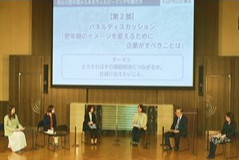 February 2023, a joint seminar with other companies on "Well-being work styles from the perspective of menopause for both men and women"
February 2023, a joint seminar with other companies on "Well-being work styles from the perspective of menopause for both men and women"
Dai-ichi Life Woman's Day
As a domestic initiative, we have been holding Dai-ichi Life WOMAN's Day since fiscal 2023, in conjunction with International Women's Day and Women's Health Week.
Last year, G-CEO Kikuta delivered a message highlighting the importance of empowering diverse talent. Guest speaker Ms. Yoshie Komuro shared her insights on balancing diverse life choices and careers, and how work-life balance contributes to organizational growth.
During a talk session with a male executive of the Dai-ichi Life who has taken childcare leave, both the supervisor and subordinate perspectives were discussed, including what each individual can do in their respective roles. The session offered participants valuable insights and encouraged reflection on their own actions based on the speakers' experiences.
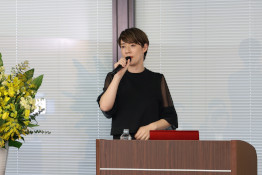
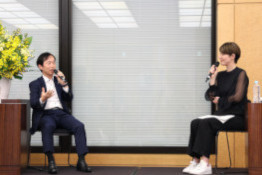
External Recognition
Dai-ichi Life Holdings, Inc. has been selected as a "Nadeshiko Brand" for fiscal 2023, a joint selection by the Ministry of Economy, Trade and Industry and the Tokyo Stock Exchange of listed companies that excel in promoting the active participation of women.
This is the fourth time that our group has been selected, having been selected as a "Nadeshiko Brand" in 2014 and 2018, and as a "Semi-Nadeshiko Brand" in 2019.
We were recognized for its efforts to promote the active participation of women in the workplace through a combination of "consistent career development support from recruitment to promotion" and "work-life balance support for both men and women that enables dual-income, dual-care households".
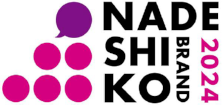
Participation in the initiative
We participate in initiatives to promote the advancement of women and communicate in various ways from top management to external audiences.
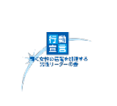
|
Principles of conduct of the "Association of Male Leaders to Accelerate the Active Participation of Shining Women" supported by the Cabinet Office | |

|
"A global campaign aimed at increasing the proportion of women in key decision-making bodies of companies, including the board of directors, which began in the United Kingdom." | |
|---|---|---|

|
Keidanren's campaign aimed at forming a movement of top management toward the same goal as 30% Club Japan | |

|
Code of Conduct jointly established by the United Nations Global Compact and UN Women | |

|
Private sector alliance for the Empowerment and Progression of Women's Economic Representation |
Active Participation of Employees with Disabilities
The Dai-ichi Life Group actively employs people with disabilities in order to achieve normalization*, and approximately 1,000 employees with disabilities are active throughout the group.
In order to promote the employment of people with disabilities and understanding of disabilities, we provide educational training for all employees. In addition, we have set up a consultation service for people with disabilities, and we are working to create an environment where people with disabilities can work with peace of mind, by responding to individual consultations from employees with disabilities.
- *
normalization: the philosophy that a society in which people with and without disabilities live together in the community, respecting and supporting each other as members of society, is the natural state of society.
Initiatives of Dai-ichi Life Challenged
Dai-ichi Life Challenged Co. Ltd. was established in August 2006 as a subsidiary of Dai-ichi Life and was certified as a special subsidiary in November 2006. Dai-ichi Life Challenged mainly hire those with intellectual and mental disabilities and currently have over 400 employees working in 8 locations. We strive to create a culture where every individual can be entrusted towards personal growth while accepting and supporting each other.
Dai-ichi Life Challenged Co.,Ltd.(Japanese Only)
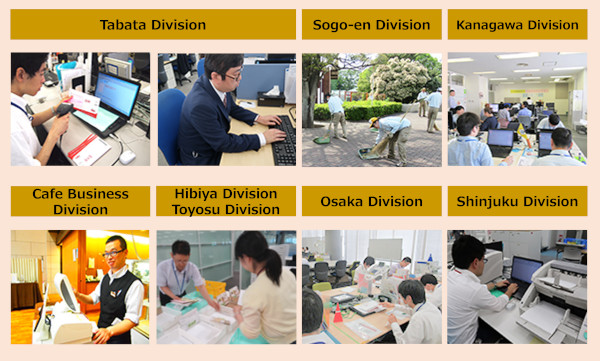
At Dai-ichi Life Challenged Co., Ltd., we do a wide variety of work in various departments.
The main work is work commissioned by the Dai-ichi Life Group, and is wide-ranging, including data entry using computers, document creation, printing, shipping, and organization, as well as coffee shop and cleaning work for the welfare of group employees. Through work, we are challenging ourselves to develop our skills while making the most of each person's strengths and complementing each other, and also learning new work.
Global Diversity
Group Initiative Task and Global Leaders Committee
With the goal of solving issues that surrounds the Group, the Dai-ichi Life Group has established various task forces (Group Initiative Task Force) consisting of members from each of the overseas Group Companies. These task forces cover a wide variety of topics to engage in Group-wide collaborative initiatives. With our diverse range of global talent and specialties, our Group engages in discussions to solve issues and create value. In addition, our Group has established the Global Leaders Committee (GLC), a forum composed of executives from overseas group companies and domestic executive officers, to discuss the Group's management and business strategies and to share its philosophy and policies.
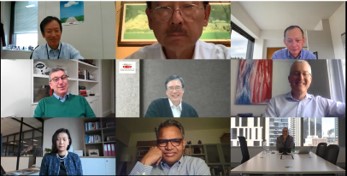
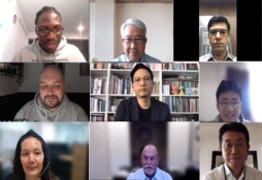
Global Talent Development
Aiming to become a "Global top-tier insurance group", we provide a variety of development opportunities that not only enhance employees' practical understanding and expertise through daily operations, but also help them build language proficiency and global business skills. Through the cycle of “Measure, Strengthen, and Demonstrate,” we are committed to developing talent equipped with world-class perspectives and skills essential to realizing our vision of becoming a "Global top-tier insurance group".
Measure:
To assess and visualize English language proficiency and use the results as a benchmark for further skill development, we offer opportunities to take standardized tests such as TOEIC and VERSANT.
Strengthen:
Employees can select programs that match their current language level and personal goals, providing opportunities to acquire practical language skills that are useful in real business contexts. We also offer overseas training programs for young employees—including internships with foreign companies and on-the-job training (OJT) at overseas group companies—as well as self-directed learning options such as English conversation coaching and online English lessons.
Demonstrate:
Employees put their skills into practice by taking on roles such as overseas assignments, trainee placements, or studying abroad. Others contribute by effectively handling cross-border business with overseas group companies and international partners.
Global DE&I Summit
DE&I activities vary depending on the environment in each country, but in 2022 we began considering promoting them across the entire group, and as part of this, we have been holding the "Global DE&I Summit" online every year since that year. The second summit, held in October 2023, Summit, over 70 leaders from various countries and companies gathered to learn together on the theme of "inclusive leadership", which is essential for fostering an inclusive culture and promoting collaboration.
In the panel discussion with the CEOs of group companies from the US, Myanmar, and Japan, as well as external lecturers, the participants exchanged frank and open opinions from various perspectives on the elements and challenges of inclusive leadership that each of them emphasized, as well as future initiatives, and many valuable practical examples were shared with the participants. Group discussions were also held with the participants, and lively discussions were held on how to demonstrate leadership in their own workplaces.
As a global company, promoting DE&I is not only essential for creating an environment where each and every diverse employee can thrive, but also for contributing to customers, partners, and local communities through our business. Through the holding of such summits, we will continue to work to promote DE&I across the entire Group.
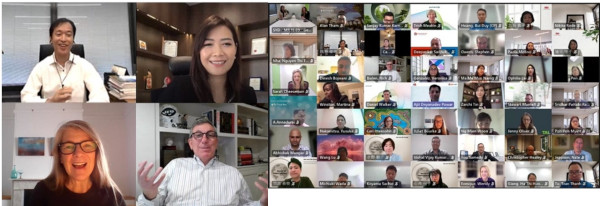
Work-Life Balance
Dai-ichi Life strives to promote work-life management of our employees based on two pillars - the Improvement of work-life support systems and the promotion of flexible work styles and creating an environment in which our employees can work with enthusiasm. Further, from fiscal year 2022, for the promotion of having our male employees taking on a more active role in childcare with their partners, Dai-ichi Life has set a company goal of 100% of our employees who will become expecting fathers take paternity leave for a minimum 1 month cumulatively. In addition, we hold seminars to promote awareness and provide educational materials on taking childcare leave and provide communication tools for managers and team members.
Promotion of flexible workstyles
Reduction of total working hours
- A target time of for the end of the working day (bottom line target)
- Planning a "Work Smart Day" once a week month (no-overtime day)
- Planning a "Blue Sky Day" at least once a month (starting the workday at 10am or finishing at 3pm)
- Automatic PC shutdown by 8:00 pm
- A minimum 11-hour interval between workdays
Promotion of various types of leaves
- Target of acquiring 70% of annual paid leave
- Our company encourages employees to take at least one day of paid leave per month (excluding summer and New Year's holidays).
- Acquisition of a "Connect holiday" (a combination of paid holidays with National holidays and / or weekends)
- QOL improvement leave (leave intended to improve QOL/health, such as to nurse family members, attend school events for children in junior high school and above, go to hospitals for fertility treatment, go to hospitals for menopause treatment, participate in volunteer activities, take health checkups)
- Hourly paid leaves
- Establish work–life management (WLM) indicators, thereby visualizing each organization's working hours, usage rate of paid leave, and usage rate of telework
- *
At our company, paid leave—including annual paid leave—is treated as equivalent to a full working day in terms of prescribed working hours, and wages are paid accordingly.
- *
Regarding the five days of annual paid leave mandated under Japanese law, we monitor the usage status of all employees throughout the year. When necessary, individual reminders are issued to ensure full compliance with this requirement.
Promotion of diverse working styles
- Utilization of teleworking
- Utilization of flextime and staggered working hours
- Introduction of casual dress code
- Approval of side-jobs outside of the company
- My Career Preparation Leave (As a measure to enable flexible career development, employees can take unpaid leave for up to three years. Employees can acquire deeper skills and career development by entering full-time graduate school, etc. Also applicable to truly unavoidable family circumstances such as devoting oneself to infertility treatment over the medium to long term.)
Enhancing support systems for balancing childcare and work
- *
The following primarily describes systems and initiatives that exceed legal requirements or are unique to our company.
Support from pregnancy to birth
- Prenatal and postnatal leave (100% paid leave for 6 weeks before and 8 weeks after childbirth)
- Maternity leave (up to 5 days per month can be used as paid time for pregnancy-related ailments such as morning sickness and hospital visits)
- Leave when spouse gives birth (3 paid days granted when spouse gives birth)
- Grandchild birth leave (3 paid days granted upon the birth of a grandchild)
Childcare support
- Childcare leave (until the end of April or end of October, whichever comes first a month after the child turns 1 year and 6 months old; depending on the situation, this can be extended until the child turns 2 years old)
- Childcare Time (Up to two 30-minute breaks per day for employees with children under the age of one)
- Child support / Childcare leave (Up to 12 days (paid leave) per fiscal year for nursing care of children's illnesses and other issues, regular vaccinations, health checkups, temporary closure of children's schools, and participation in school events until the child finishes their sixth year of elementary school)
- QOL improvement leave (Paid days off that can be used for nursing care of children's illnesses, participation in school events, and similar reasons for children in junior high school and above)
- Special Paid Leave for Child's Infectious Illness (up to five days of paid special leave per fiscal year when caring for a child (up to the end of elementary school) who has contracted an infectious disease as defined by the School Health and Safety Act, or when the child's class is temporarily closed under the same Act.)
- Reduction of working hours and exemption from overtime until a child graduates elementary school
- Subsidy for childcare support service expenses
- Access to childcare-related services through “Benefit Station” (Employees can use a variety of childcare-related services at discounted rates—such as baby products (including nursing wear and breastfeeding equipment), babysitting, housework support, and assistance with nursery school applications. In addition, points that can be used for various services are granted annually)
- [Starting October 2025] Early Comeback Support Plan (Female employees who return to full-time work (including exemption from overtime) from maternity or childcare leave before their child reaches 14 months of age will receive points equivalent to ¥50,000 per month. These points can be used for childcare-related services through the Benefit Station cafeteria plan until the child turns two years old)
Support for men participating in childcare
- Promoting the goal of 100% of male employees to take childcare leave for a total of 1 month or more
- Up to 20 days paid leave are granted for each child when taking childcare leave
- “Fatherhood Training Program” held for male employees and their partners
- Shared stories of male employee's experiences of childcare leave on the company intranet
The promotion of male employees taking childcare leave
From fiscal year 2022, we have been working towards the goal of having 100% of our male employees take a cumulative total of at least one month of childcare leave. We are implementing initiatives that go beyond legal requirements, such as raising awareness through "Fatherhood Training Program" so that our male employees can proactively engage in childcare and housework, submitting written childcare leave plans, and granting up to 20 days of paid leave. We also hold "Ikuboss seminars" for management-level employees, share experiences of male employees who have taken paternity leave on our Intranet, and work towards creating a workplace environment where diverse employees can support each other through understanding and collaboration.
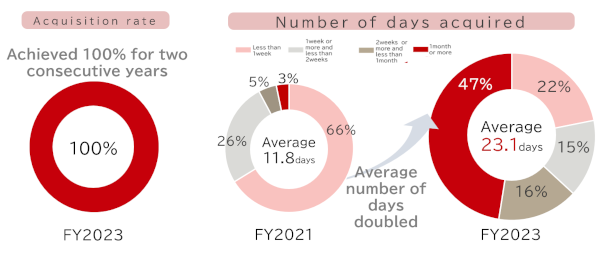
- *
5 Total for Dai-ichi Life Holdings, Dai-ichi Life, Dai-ichi Frontier Life and Neo-First Life
Support for Balancing Various Life Events and Work
Nursing care support
- Nursing care leave (a total of 730 days can be taken from the start date of each person requiring care)
- Nursing care support leave (up to 12 days (paid leave) per fiscal year can be taken to accompany hospital visits or care for to a person in need of care)
- Reduced work hours and exemption of overtime for nursing care
- QOL improvement leave (For nursing care of family and relatives)
- Distribution of the Work and Nursing Care Balance Handbook
- Holding seminars and roundtable discussions on nursing care
Medical treatment support
- Medical leave
- QOL improvement leave and My career preparation leave (For fertility treatment; QOL improvement leave can also be used for menopause treatment)
Other support measures
- Holding an “Ikuboss Seminar” for management-level employees
- F Leave (two days a month leave for menstruation-related ailments)
- Family Transfer System (Transfer system due to family reasons for employees in a job category with limited working areas)
- Leave to accompany spouse secondment abroad (Up to three years unpaid leave when accompanying a spouse's international secondment)
- Distribution of the Work-Life Support System Handbook
- Work-Life Balance Support Hotline
- Access to childcare, nursing care, health, and medical treatment services through “Benefit Station” (Employees have access to a range of services related to childcare, nursing care, health, and medical treatment through “Benefit Station.” In addition, points that can be used for these services are granted annually)
- [Starting October 2025] Maternity, childcare, and nursing care support subsidy (One-off payments will be provided to employees whose work is affected by coworkers taking three or more consecutive months of leave for maternity, childcare, or nursing care)
External Recognition
Based on the Law for Measures to Support the Development of the Next Generation, Dai-ichi Life Insurancewe obtained the “Platinum Kurumin Plus Certification” from the Ministry of Health, Labor and Welfare. The “Platinum Kurumin Plus Certification” is a newly established system in April 2022. Based on the Act on Advancement of Measures to Support Raising the Next-Generation of Children, the certification was granted in recognition of the company's high level of childcare support and its efforts to create a workplace environment that facilitates work and infertility treatment.
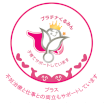
Support of balancing work and infertility treatment
Introduction and awareness of support systems for work-life balance
- A leave system used for infertility treatment, annual paid leave taken by the hour, a flextime system, teleworking system among other systems were all informed through the company's “Work-Life Support System Handbook”
Promotion of the understanding of infertility treatment
- Seminars and training on the theme of infertility treatment was conducted for all employees
- Voices of employees who have experienced infertility treatment was posted on the company's intranet as a message as a company that supports work-life balance
Establishment of an in-house consultation desk
- A work-life balance support consultation desk was established to create a system where the person in charge can respond to employee inquires on an individual basis
Usage of various systems
| 2022 | 2023 | 2024 | |
|---|---|---|---|
| Employees taking childcare leave | 1,477 | 1,329 | 1,295 |
| Rate of employees return after childcare leave | 91.9% | 90.4% | 92.0% |
| Number of employees working reduced hours for childcare | 508 | 536 | 564 |
| Number of employees utilizing childcare service subsidies | 2,901 | 2,827 | 2,751 |
| Number of employees taking nursing care leave | 214 | 144 | 125 |
| Average monthly overtime hours (in-house employees) |
5.4 hours | 5.5 hours | 6.5 hours |
| Average number of days of paid annual leaves taken | 14.7 days | 15.3 days | 15.1 days |
| Average utilization rate of annual leave | 75.4% | 78.7% | 78.5% |
| Rate of male employees taking childcare leave | 100% | 100% | 100% |
LGBTQ-Friendly
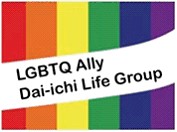
Dai-ichi Life clearly expresses its respect for basic human rights in the Dai-ichi Life Human Rights Declaration ![]() . As a part of its efforts to ensure Diversity, Equity & Inclusion, the Company also promotes initiatives to make it a LGBTQ friendly company.
. As a part of its efforts to ensure Diversity, Equity & Inclusion, the Company also promotes initiatives to make it a LGBTQ friendly company.
Initiatives to customers
Insurance Beneficiary
If a policyholder wishes to designate a same-sex partner as a policy beneficiary, the designation procedures are easier to follow so long as the policyholder submits a copy of the certification issued under the partnership oath system of local governments.
Initiatives to employees
Full Provision of Information
Dai-ichi Life provides seminars to all employees to promote understanding of LGBTQ individuals.
Establishment of Consultation Desk
Dai-ichi Life has established a system consisting of a consultation desk to respond to individual cases of consultation concerning LGBTQ issues.
Formulation of LGBTQ Policy
In the policies (including the Code of Conduct) that employees are to follow, it explicitly states not to discriminate against others because of their sexual orientation or gender identity.
Extended Application of Leave System
In the Leave system for marriage, childbirth, etc., persons eligible for the system in principle now include the same-sex partners of employees in the same manner in which spouses are, based on objective materials, etc.
Extended Application of Use of Company Housing
In the standards for granting the use of company housing, same-sex partners in principle shall be considered family members, based on objective materials, etc.
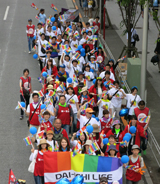
Efforts for Experienced Hires
In addition to securing skilled and specialized talent to support business model transformation and future business development, we are strengthening our efforts in mid-career hiring to promote diversity in knowledge, experience, and perspectives.
In FY2024, we made 149 mid-career hires, a significant increase from 80 hires in the previous fiscal year. Over one third of these were from non-financial institution backgrounds. Further, under the Group HR governance pillar, we are also actively promoting external appointments at the executive level. We are promoting the creation of a flexible organization that brings together talent with diverse experiences and transforms environmental changes into opportunities. At the same time as attracting talent that will create the future of Dai-ichi Life Group, unrestricted by the frame of insurance, we are moving forward with building an environment where anyone, regardless of their background and personal history, can realize their ideal career and play an active role in the Company.